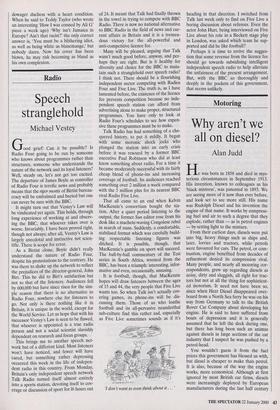Radio
Speech stranglehold
Michael Vestey
Good grief! Can it be possible? Is Radio Four going to be run by someone who knows about programmes rather than structures, someone who understands the nature of the network and its loyal listeners? Well, steady on, let's not get too excited. The departure of James Boyle as controller of Radio Four is terrific news and probably means that the rigor mortis of Birtist bureau- cracy will be embalmed and buried but one can never be sure with the BBC.
It might turn out that Vestey's Law will be vindicated yet again. This holds, through long experience of working at and observ- ing the BBC, that whoever takes over is worse. Invariably, I have been proved right, though not always; after all, Vestey's Law is largely anecdotal and instinctive not scien- tific. There is scope for error. As a Birtist clone, Boyle didn't really understand the nature of Radio Four, despite his protestations to the contrary. He was there to shake up the network to reflect the prejudices of the director-general, John Birt. This he did to Birt's satisfaction but not to that of the listeners. Audiences fell by 600,000 but have since risen for the sim- ple reason that there is no alternative to Radio Four, nowhere else for listeners to go. Not only is there nothing like it in Britain, it is unique in the world, except for the World Service. Let us hope that with his successor Vestey's Law is seen to be flawed, that whoever is appointed is a true radio person and not a social scientist slavishly dependent on research and focus groups. This brings me to another speech net- work but of a diffefent kind. Most listeners won't have noticed, and fewer will have cared, but something rather depressing occurred this week in the life of indepen- dent radio in this country. From Monday, Britain's only independent speech network Talk Radio turned itself almost entirely into a sports station, devoting itself to cov- erage or discussion of sport for 16 hours out of 24. It meant that Talk had finally thrown in the towel in trying to compete with BBC Radio. There is now no national alternative to BBC Radio in the field of news and cur- rent affairs in Britain and it is a tremen- dous victory for the all-powerful and anti-competitive licence fee.
Many will be pleased, arguing that Talk wasn't much good before, anyway, and per- haps they are right. But is it healthy for diversity and choice for the BBC to main- tain such a stranglehold over speech radio? I think not. There should be a flourishing independent sector competing with Radios Four and Five Live. The truth is, as I have lamented before, the existence of the licence fee prevents competition because no inde- pendent speech station can afford from advertising alone to make proper, structured programmes. You have only to look at Radio Four's schedules to see how expen- sive these programmes must be to make.
Talk Radio has had something of a che- quered history, to put it mildly. It began with some moronic shock jocks who plunged the station into an early crisis before it was rescued by a former BBC executive Paul Robinson who did at least know something about radio. For a time it became moderately successful with its fairly cheap blend of phone-ins and increasing coverage of football. Its audiences reached something over 2 million a week compared with the 5 million plus for its nearest BBC rival Radio Five Live.
That all came to an end when Kelvin MacKenzie's consortium bought the sta- tion. After a quiet period listening to the output, the former Sun editor rose from his desk like a machete-waving Congolese rebel in search of nuns. Suddenly, a comfortable, stabilised format which was carefully build- ing respectable listening figures was ditched. It is possible, though, that MacKenzie's gamble on sport will succeed. The ball-by-ball commentary of the Test series in South Africa, wrested from the BBC, has been a triumph: interesting, infor- mative and even, occasionally, amusing.
It is football, though, that MacKenzie hopes will draw listeners between the ages of 15 and 44, the very people that Five Live wants too. So when Talk isn't actually cov- ering games, its phone-ins will be dis- cussing them. Those of us who loathe football and its all-pervasive neanderthal sub-culture find this rather sad, especially as Five Live sometimes sounds as if it's `I don't want to even think about it . . heading in that direction. I switched from Talk last week only to find on Five Live a boring discussion about referees. Even the actor John Hurt, being interviewed on Five Live about his role in a Beckett stage play in London, was asked which team he sup- ported and did he like football?
Perhaps it is time to revive the sugges- tion that some revenue from the licence fee should go towards subsidising intelligent independent speech radio to help alleviate the unfairness of the present arrangement. But, with the BBC so thoroughly and deeply in the pockets of this government, that seems unlikely.


























































 Previous page
Previous page